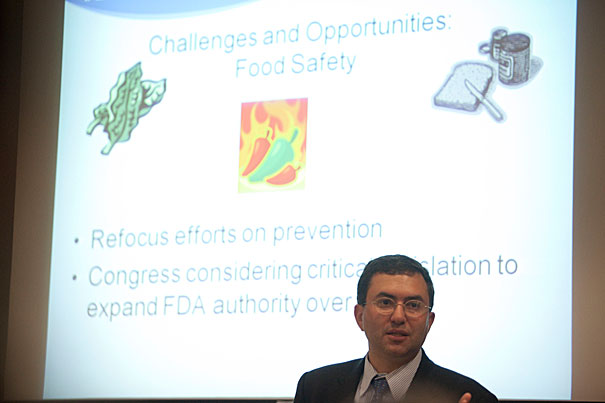
Joshua Sharfstein said he wanted to speak at the Harvard School of Public Health because the FDA is interested in strengthening its ties to the nation’s public health community. The FDA, Sharfstein said, got its start in crisis and has seen its growth and influence driven by various health concerns since then.
Kris Snibbe/Harvard Staff Photographer
Be skinny, be strong, be loved — be fooled
Busy FDA keeps watch against marketing spiked supplements
Weight loss, muscle building, and sexual enhancement supplements are sometimes spiked with known and unknown drugs that could have potentially deadly consequences, a U.S. Food and Drug Administration (FDA) official said Wednesday (Oct. 13).
Joshua Sharfstein, the FDA’s principal deputy commissioner and a graduate of Harvard College in 1991 and Harvard Medical School in 1996, said the agency is very concerned about the dietary supplements spiked with pharmaceuticals approved for other uses or with chemical analogs to known pharmaceuticals, whose altered molecular makeup means they won’t show up in regulatory screenings.
“I think there’s a potential risk for one of these to harm a lot of people,” Sharfstein said.
Other current threats on the FDA’s radar include medical devices made overseas, where quality varies widely, unsafe usage of approved medicines, tobacco control, and the campaign for food safety.
Sharfstein made those comments at the Harvard School of Public Health, where he delivered the Benjamin Waterhouse Memorial Lecture, the first of a new series sponsored by the Center for Global Tobacco Control in the Department of Society, Human Development, and Health.
Sharfstein said he wanted to speak at the School because the FDA is interested in strengthening its ties to the nation’s public health community. Though a regulatory body, Sharfstein said, the FDA is also a public health organization, monitoring the nation’s drug supply, food supply, and substances such as tobacco.
The FDA, Sharfstein said, got its start in crisis and has seen its growth and influence driven by various health concerns since then. The FDA was created in the 1906 Pure Food and Drug Act amid widespread concern about safe foods and poisonous patented medicines. At the time, Sharfstein said, those medicines’ ingredients were unknown to the public and often included high amounts of alcohol or other drugs. The law gave the FDA the power to remove unsafe products from the market and create labeling requirements, but did not give it power to review products for safety before they hit the market or to review them for effectiveness.
The sulfanilamide crisis of 1937, when more than 100 people died from drinking a medicine laced with diethylene glycol, led to the 1938 Food, Drug, and Cosmetic Act, which gave the FDA power to conduct premarket reviews for safety. In the 1960s, the thalidomide crisis led to widespread birth defects in children born to mothers who took the drug, prompting another expansion of the FDA’s powers, allowing it to review for both effectiveness and safety. That law led to establishing the current three-phase clinical trials for new drugs before they hit the market.
In recent decades, other crises led to expansion of the FDA’s powers to review medical devices, to approve generic medicines, and to issue emergency permits for unapproved drugs in cases of emergency.
Last year, the FDA received the power to regulate tobacco products. Sharfstein said the organization aims to prevent youth tobacco use and to help adults to quit smoking.
“There is just an enormous amount of work to be done at the FDA,” Sharfstein said.





